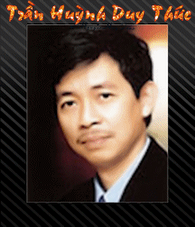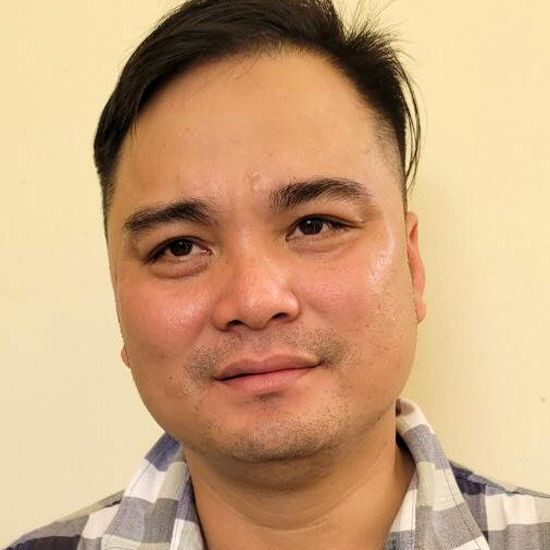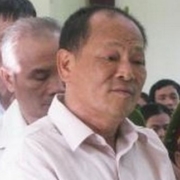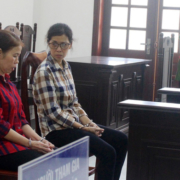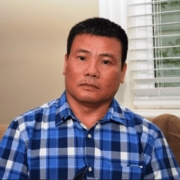Tran Huynh Duy Thuc’s Letter From Prison, September 2018: “Creative Methods Are Needed to Bring Freedom to Our Society”
Imagine being locked in a prison cell– completely isolated from other prisoners– growing increasingly more uncomfortable from the extreme physical heat inside the tiny room and unable to receive letters from your family. In July, at Prison No. 6 in Nghe An province, Tran Huynh Duy Thuc was placed under solitary confinement in miserable heat and staged a three-day hunger strike to protest the move.
Thuc is no stranger to harsh prison conditions. In his over ten years in prison, he has often been targeted for standing up for the rights of other prisoners and has had communication with his family, as well as supplies, limited by the authorities. He has undertaken numerous hunger strikes, including a 34-day strike in the summer of 2018. After his strike in July 2019, authorities released him from continuous confinement, but he was still only allowed out of his cell for 14 hours per week, seven hours on both Saturday and Sunday.
In his years of blogging about economic and political conditions, as well as throughout his decade of imprisonment, Thuc has been a beacon of hope for those fighting for democracy and human rights in Vietnam, inspiring activists with his vision for peaceful change. Thuc continues to try to use legal mechanisms to create this change, as evidenced by his attempts to appeal his sentence in light of changes to Vietnam’s Criminal Code. The new code, which took effect on January 1, 2018, added a new clause on the act of “preparation to commit a crime” to Article 109 (formerly Article 79) for which a more lenient punishment applies (one to five years of imprisonment). Thuc’s lawyer argues that his case meets the conditions of the new clause.
While he has been offered early release in exchange for leaving the country, he refuses to be exiled from Vietnam. He has possibly faced retaliation from prison authorities for this decision and for the continued assertion of his rights. He suffered health issues from a possible poisoning on November 20, 2018, and as of July 2019, he still could not receive letters from his family.
On November 29, 2019, Thuc spent his 11th birthday in prison– and he still will have to serve five more until he can celebrate out in the world with his family. Last week, we interviewed his daughter to get an update on his current situation. And this week, we would like to share more of Thuc’s writing to continue to remind the world of his commitment to Vietnamese democracy and economic and social improvement.
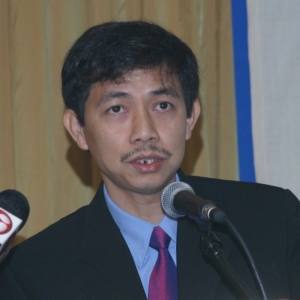
Tran Huynh Duy Thuc, engineer, internet entrepreneur, and blogger. Used in the Amnesty International Report: ASA 41/007/2013 – Silenced Voices. Prisoners of Conscience in Viet Nam
***
Tran Huynh Duy Thuc is an engineer and entrepreneur from Ho Chi Minh City. He founded EIS, a successful Internet phone service company. It was the first Vietnamese company to invest in high technologies abroad. Thuc founded the Chan research group to study the economy, politics, and society of Vietnam.
Thuc was arrested on May 24, 2009 and held in pre-trial detention, where he was possibly tortured in attempts to solicit a coerced confession. He was initially arrested for “theft of telephone wires,” but later charged under Article 79 for subversion. He was tried on January 20, 2010, with three co-defendants (Nguyen Tien Trung, Le Cong Dinh, and Le Thang Long) in Ho Chi Minh City. He was sentenced to sixteen years in prison and five years of probation.
___________________________________________________________________________________________________________________________________
Nghe An,
September 29, 2018
Dear Sister 5 and the family,
Today is Saturday. Last Saturday was Grandpa’s deathday. Did our family have a full gathering? Grandpa passed away during the month of Ullambana. During this period, I’m often sad thinking about the past. Maybe it’s because I’m getting old.
A few days ago, I read in Youth [newspaper] about the conclusions from the investigation of the Thủ Thiêm land grab that happened 20 years ago, and it made me homesick again, because it was linked to the piece of land in Giồng Ông Tố, the final resting place of our ancestors.
In her letter, Sister 2 wrote that in early June she heard the sound of rails cocking and was reminded of a poem of mine, which she titled “Heavenly Bells,” and she thought that I might be coming home soon. Did you know that the white-vested waterhens, the rails, and the watercocks belong to the same family and aren’t that much different from each other? Waterhens typically are found up North, watercocks in the South, and they make a fairly similar sound… “toc, toc, toc…” like our tapping on the wooden fish at the altar. But people up North hear it like “quoc, quoc…” or “cuoc, cuoc…,” which produced a tale as follows.
Once upon a time, a patriot was exiled far away from his country. Every day he looked toward his homeland with sorrow and yearning. As he aged, his hopes dimmed; at night he would call out “quoc, quoc…” [country, my country]. Finally, he died and became the ‘cuoc’ bird. And that’s the story of the waterhen.
I learned this story when I was small, and now I feel quite sad – as if the ‘cuoc’ and I share a similar fate. Of course, I was too little then to understand what patriotism meant. And I didn’t know about the wild watercocks [cum num] until after graduating from college. They’re sold widely by country folks in the Southwest. During the time I spent in that part of our country, I often heard them at night, making that distinctive sound just like that of the wooden fish at some pagoda. At first I thought it was the sound of people praying at night in their homes, but I later found out it was the watercocks. The sound is just like the wooden fish but without the peaceful, reassuring tone; it’s more mournful somehow, and that’s why I always remembered it. At the time, I had no idea the Northern ‘cuoc’ sounded the same.
I arrived at camp B34 in the summer, the mating season of rails. Their night calls sound just like that too. Some families around here raise rails; their distinctive calls waffle from the distance and enter our cells, one by one.
But it wasn’t until I was transferred to the Nghệ An prison that I learned how the watercock [cum num] and the waterhen are the same species. There are a lot of waterhens in this part. In the summer, they call for mates; in the winter, they cry for death. I learned from one of the cellmates who grew up in this part of the world about the waterhens. And after looking them up in books and dictionaries, I discovered that they’re from the same family of waterfowls.
If their summer calls sound somber, their winter calls can only be described as truly depressing. In the wintertime, they perch on tree branches all day and night without eating or sleeping, making that mournful sound for days on end until they eventually die. One always hears the sound of waterhens during winter nights here. It reminds me of that story I learned as a child, and the time I spent in the countryside after graduation. It makes me sad yet even more determined. It was precisely those days spent crisscrossing the Southwest that helped me clarify and understand what love of country truly means. And that love kept growing deeper with time, leading me down the path that I have chosen.
From the end of May to the end of June is summertime here, so the air was full the cocking sound of waterfowls. But their sound this time gave me a different feeling, signaling that I was about to leave this area. My intuition strongly hinted that the road ahead was about to take a sharp turn, and that I myself would be facing a decisive choice. Actually this was more than just intuition; the flow of events also was pointing in that direction.
Toward the end of last May, two people from the CSS [Central Security Services] came to see me. On 23 of June, Sister 6 visited and told me that Attorney [Nguyễn văn] Đài was exiled to Germany the first week of June, 2018. I instinctively knew that I was about to confront a new challenge – to leave or to stay. Even before Sister 6 told me about this, through my dreams I could already guess what choices I would have to make on the road ahead. Unlike previous times, this time I made my decision very quickly without hesitation. When the opportunity to leave was presented, I would choose to stay. I already was ready for this response at the beginning of June. Not long after, a delegation from the EU and the German Embassy came to visit. I told them my decision and knew from that moment I had officially accepted a critical and difficult challenge.
I was very moved when I read Sister 2’s letter telling me how she heard the rails and thought of me. This was proof of synchronous occurrences across space that we sometimes describe as “happenings from heart to heart.” She heard and felt those things between the end of May and early June, around the same time I was using my intuition and reasoning – as well as my heart and mind – to contemplate those things associated with the waterhens. I made my decision because I never want to die like the ‘cuoc’. I trust that you all sympathize with me in this matter.
There’s nothing wrong or bad about choosing to leave. Starting several months ago and up to September of this year, Tuổi Trẻ Magazine was running articles about the phenomenon of Vietnamese activists emigrating abroad. This is a basic human right and a choice individuals should be able to make, depending on what’s best for them. I’ve chosen to stay because I strongly believe that’s the best option for me. But I also know that of those who chose to leave, many are missing the home country. Ensuring that those who choose to stay can stay without fear, and those who leave can leave without yearning – that’s what I really want to see, and that’s why I decided to stay.
A few days ago a Colonel from Bureau 10 (formerly Bureau 8) came in to talk. He said to me: “I heard that the EU visited you and you decided not to go because you love this S-shaped little land of ours. That is the correct choice because there is no place like our country of Vietnam.”
Twice, on August 31 and September 16, when you visited me, I really believed it when you said to me: “I fully understand your decisions and your actions. Do not worry. The family supports you and will carry out your wishes.” I could see the confidence and empathy in your eyes. By the way, the heavenly bells aren’t the sound of the rails. They were the sound of church bells that only I heard during the time at the B34 prison camp. When I was transferred to Xuân Lộc, I didn’t hear them anymore.
Folks around here believe that if you could get a tree branch upon which a ‘cuoc’ called until it died, and use it to whip a young man or young woman with whom you’re infatuated, you could make them fall in love with you. It’s a baseless belief, of course. But there’s another story about the ‘cuoc’ that’s worth pondering: they always follow a beaten path. Whichever trail they go out on, that’s the way they’ll always return– no matter what– unless that trail disappears. So if you want to catch them, all you have to do is find their footprints and set your traps along their trail.
This particular trait and their melancholy call must be related somehow. It is not enough to have the love and the thirst for something; you also need new methods and creativity. The patriotic love for our country that we’ve been professing for centuries still can’t be realized because we’ve been traversing the same old beaten paths, unwittingly repeating the same things that we’re trying to change. If we’re lucky, we might succeed every now and then and produce a new bottle, but the wine was always the same. We usually fail, however, because we keep falling into the same old traps. Sometimes we even set the trap upon ourselves, unknowingly.
I’m very happy that at the last two visits you said our family has understood and has chosen not to follow the typical routes in seeking release for me. My Path to Justice must be one based on creativity. Please remember that a Path to Justice is the road I’m taking – not a pathway which allows me to leave or stay. The Path to Justice will not only lead me home, it will also bring a brighter future for everyone. Otherwise, why would I even choose imprisonment? Why would we, out of personal concerns, choose to spend a few years less in jail at the expense of justice? Realizing that point is the key to understanding the importance of creativity. Our greatest strength is our ability to think creatively. If we just blindly and diligently follow the same old paths, we won’t be able to avoid a bleak future. Not even for another thousand years.
I understand that in the current campaign for my release, everybody concurs that creative methods are needed to bring freedom to our society. Enlightenment has begun, and the light will only get brighter. Real and sustainable freedom lies in the individual’s free will – the will to want and allow freedom for oneself instead of begging for it from someone else. As long as we wait for freedom or any other right to be given to us, we are not free. The other day you said: “I won’t allow anyone to give me or take away my human rights.” That is great. Keep up that creative spirit.
I have written to Dad and our family on many occasions to affirm that I have the necessary strengths to withstand these hardships over many years, as long as we can reach the goal on our Path to Justice. I can overcome much more difficult challenges than these mundane events. As you all have witnessed over the past years, the greater a challenge that befell me, the further I advanced on the Path to Justice.
Bear in mind that on the subject of “resonant energy,” I have shown our younger brothers in here the techniques of absorbing the energy of your attacker and turning it into energy for yourself – similar to the way one uses sails to steer his boat against the wind.
–Tran Huynh Duy Thuc
Source: https://tranfami.wordpress.com/2018/11/10/thu-120a-tu-do-thuc-chat-va-ben-vung/
oOo
Nghệ An, 29/9/2018
Chị Năm và cả nhà thương
Hôm nay thứ Bảy. Thứ Bảy tuần trước giỗ ông nội, cả nhà tề tụ về đông không? Ông nội mất vào tháng lễ Vu Lan. Vào những ngày này em thường buồn buồn và hồi tưởng về những ngày xưa. Có lẽ tại già rồi. Mấy hôm trước đọc các bài trên báo Thanh Niên viết về kết luận tranh tra đất đai ở Thủ Thiêm xảy ra hơn 20 năm trước, lại càng thấy nhớ nhà vì nó liên quan đến mảnh đất ở Giồng ông Tố làm nơi yên nghỉ cuối cùng của họ hàng mình.
Thư J3/2018/a của chị Hai kể hồi đầu tháng 6 vừa rồi chị nghe tiếng gà nước kêu và hồi tưởng đến bài thơ của em mà chị đặt tên là “Chuông trời”, rồi nghĩ rằng em sắp về. Cả nhà biết không, cúm núm, gà nước, chim cuốc đều cùng một họ gà nước và không khác nhau nhiều lắm. Cuốc thường sống ở miền Bắc, cúm núm ở miền Nam. Tiếng kêu của chúng khá giống nhau, gần như tiếng mõ chùa vậy, “tốc tốc tốc …”. Nhưng ở miền Bắc, người ta cảm nhận âm thanh đó như là “quốc, quốc, … hay cuốc, cuốc …” nên mới có sự tích con cuốc như sau.
Có một nhà yêu nước bị đày đi biệt xứ. Ngày nào ông ấy cũng vọng về cố hương cùng với nỗi nhớ quê ai oán. Càng lớn tuổi, hy vọng hồi hương càng tuyệt vọng nên vào buổi tối ông ấy thường gọi “quốc, quốc, …” cả đêm. Chẳng lâu sau ông ấy mất rồi hóa thành một con chim, cứ vào tối đem là kêu “quốc, quốc …”. Đấy chính là loài chim cuốc.
Em biết chuyện sự tích con cuốc này từ nhỏ và cảm thấy buồn như có gì mình chia sẻ với nó vậy. Lúc đó em còn nhỏ lắm nên chưa có ý thức gì về lòng yêu nước đâu. Còn cúm núm thì tới khi ra trường đi làm em mới biết tới. Chúng bị bày bán rất nhiều ở miền Tây. Có những đêm em lặn lội ở xứ này và nghe tiếng chúng kêu không khác gì mõ chùa. Lúc đầu em nghĩ có nhiều nhà tụng kinh nên phát ra tiếng mõ đều đặn như vậy, nhưng sau mới biết là tiếng cúm núm. Giống hệt tiếng mõ nhưng nghe không có cảm giác bình an, mà có gì đó ai oán, nên em rất nhớ cái âm thanh ấy. Tuy vậy lúc đó em không biết tiếng cuốc giống như vậy.
Em vào B34 đúng vào mùa hè, mùa của gà nước đi ăn đêm và gọi bạn tình bằng tiếng kêu như thế. Có những gia đình ở xung quanh trại này nuôi gà nước nên âm thanh của chúng văng vẳng cả đêm vào từng buồng giam. Đêm đầu tiên của em ở B34 mưa ầm ầm tới sáng nên không nghe chúng. Đến đêm thứ hai thì em nhận ra ngay tiếng cúm núm. Những ngày đầu ở đây là những đêm không ngủ. Gần sáng, khi tiếng xe ngoài đường gần như lặng rồi nhưng tiếng chúng vẫn không ngừng. Nó làm cho cảm giác nhớ nhà thật kinh khủng.
Nhưng đến khi em ra Trại ở Nghệ An này em mới biết được cúm núm và cuốc thật ra là một. Cuốc ở vùng này rất nhiều. Vào mùa hè chúng kêu tìm bạn, mùa đông chúng kêu để chết. Em nghe một người ở chung vốn là người sống ở vùng này kể về cuốc, rồi tra sách, tự điển mới biết chúng cùng một họ gà nước.
Chính những ngày lặn lội ở miền Tây Nam bộ, em đã định hình rõ, hiểu được lòng yêu quê hương đất nước như thế nào. Tình yêu ấy cứ lớn dần lên theo thời gian, đưa tới ngày em chọn con đường của mình.
Tiếng cuốc mùa hè thì buồn nhưng mùa đông nghe rất thê thảm. Chúng đậu trên một cành cây, không ăn ngủ gì, chỉ kêu không ngừng suốt mấy ngày xuyên đêm rồi rũ trên cành mà chết. Những đêm đông ở đây chưa bao giờ thiếu tiếc cuốc. Chúng khiến em nhớ lại chuyện sự tích chim cuốc hồi nhỏ và tiếng cúm núm hồi trẻ mới ra trường. Nó khiến em vừa buồn vừa quyết tâm.
Cuối tháng 5 đến cuối tháng 6 vừa rồi, mùa hè nên cuốc kêu nhiều lắm. Nhưng tâm trạng em lại khác với những mùa hè trước. Tiếng cuốc hè này làm em cảm giác em sắp xa vùng đất này và trực giác mạnh mẽ cho em biết Con đường đang chuẩn bị vào một bước ngoặt mới. Và em sẽ phải đứng trước những sự lựa chọn quyết định. Không chỉ trực giác, sự tiến triển tất yếu theo Dòng chảy cũng cho em biết như vậy.
Cuối tháng 5 có 2 người của TCAN về gặp em. 23/6 chị Sáu ra, thăm và kể luật sư Đài đi Đức cuối tuần đầu tháng 6 – 2018. Em biết em đang bước vào một chặng thử thách mới, đánh dấu bằng một quyết định đi ở. Khi chị Sáu chưa kể, qua những giấc mơ em có thể đoán được em phải vượt qua quyết định gì cho chặng đường quyết định sắp tới. Khác với lần trước, lần này em đã quyết định rất nhanh, không phải đắn đo. Em sẽ vẫn ở lại khi lựa chọn đi lại mở ra. Em đã sẵn sàng cho câu trả lời này vào đầu tháng 6. Không lâu sau, phái đoàn EU và ĐSQ Đức vào thăm. Em đã trả lời lựa chọn của mình và biết mình chính thức bước vào chặng đường thử thách quyết định từ đây.
Em rất xúc động khi đọc thư chị Hai kể chị nghe tiếng gà nước và liên tưởng đến em. Đây là một minh chứng cho sự kết nối bằng trực giác mà thường được gọi một cách hình tượng là từ trái tim đến trái tim. Chị nghe và linh cảm điều đó vào cuối tháng 5 đầu tháng 6, cũng là lúc em đang dùng cả trực giác và lý trí – con tim và khối óc – của mình nghĩ về những điều liên quan đến tiếng cuốc. Em đã quyết định như vậy vì em không muốn chết thành con cuốc. Vì vậy mà em tin chị hiểu được em trong chuyện này.
Ra đi thì không có gì sai, xấu cả. Từ mấy tháng trước đến đầu tháng 9 vừa rồi, tạp chí Tuổi trẻ cuối tuần có nhiều bài viết về hiện tượng nhiều người Việt Nam di trú ra nước ngoài định cư. Đây là một quyền lựa chọn thuộc QCN mà người ta phải được sử dụng tốt nhất cho mình. Em lựa chọn ở lại vì đó là điều tốt nhất cho em. Nhưng em cũng biết có nhiều người phải ra đi nhưng vẫn khắc khoải về quê hương đất tổ. Làm sao để mọi người lựa chọn ở lại mà không phải lo lắng, ra đi mà không phải khắc khoải. Đó là điều em mong muốn và vì vậy em quyết định ở lại.
Vài hôm trước có một ông Đại tá ở Cục 10 (trước đây là Tổng cục 8) ghé vào đây nói chuyện. Ông ấy nói: “Tôi nghe EU đến thăm anh và anh quyết định không đi vì anh yêu mảnh đất chữ S này. Đó là điều rất đúng vì không đâu bằng VN mình.”
Hai lần, 31/8 và 16/9 chị gặp em, em tin rất chắc câu chị nói: “Chị đã hiểu hết mọi quyết định và việc làm của Thức. Cứ yên tâm, cả nhà sẽ ủng hộ và thực hiện”. Ánh mắt chị cho thấy sự đồng cảm và tự tin mạnh mẽ. À, tiếng chuông trời không phải là tiếng gà nước. Đó là tiếng chuông nhà thờ mà chỉ em nghe trong suốt thời gian ở B34. Vào sáng hôm chuyển trại về Xuân Lộc thì tiếng chuông đó chấm dứt.
Dân vùng này cho rằng ai lấy được cành cây mà chim cuốc đậu trên đó rồi kêu đến chết, quất nó vào chàng trai hoặc cô gái nào mình thích thì người đó sẽ theo mình mê mệt. Cành cây đó như một loại bùa mê vậy. Đây rõ là một chuyện không có căn cứ. Nhưng một câu chuyện khác về chim cuốc rất đáng suy ngẫm. Đó là chúng luôn đi theo một lối mòn. Chúng đi trên đường nào thì chắc chắn sẽ về đường nấy và không bao giờ thay đổi con đường đó trừ khi nó không còn tồn tại. Vì vậy mà muốn bắt cuốc, chỉ cần nhìn được dấu chân của chúng, biết được lối mòn đó và đặt bẫy thì thế nào cũng bắt được.
Đặc tính này của cuốc cùng với sự tích ai oán bế tắc của nó có gì đó liên quan với nhau. Có tấm lòng và khát khao thôi chưa đủ, cần có phương pháp mới, sáng tạo. Những khát vọng yêu nước kéo dài cả ngàn năm không thành hiện thực vì con người cứ đi mãi trên lối mòn bao đời, vô tình đi vào sự sắp đặt của chính những thứ mình muốn thay đổi. May mắn thì thành công nhưng chỉ là tạo ra cái bình mới, rượu vẫn vậy. Nhưng hầu hết bị thất bại vì rơi vào những cái bẫy. Có khi tự đặt bẫy cho chính mình mà cũng không biết.
Em rất vui vì 2 lần gặp em vừa rồi, chị nói nhà mình hiểu nên không đi theo những lối mòn để vận động tự do cho em. Con đường công lý của em phải là con đường mới đầy sáng tạo. Nhớ kỹ rằng đó là Con đường công lý – Con đường em đi – chứ không phải những ngã đường để em về hay đi. Con đường công lý không chỉ đưa em về mà còn dẫn đến tương lai tốt đẹp cho mọi người. Nếu để chọn những ngã đường đó thì việc gì em phải đi tù. Nếu vì lo lắng mà vội vàng lựa chọn để ngắn hơn một vài năm nhưng từ bỏ công lý thì không bao giờ chúng ta chọn. Hiểu như vậy thì sẽ thấy cần sáng tạo như thế nào. Sức mạnh lớn nhất nằm ở suy nghĩ sáng tạo. Cứ siêng năng cặm cụi đi theo lối mòn thì chẳng bao giờ thoát ra được những định mệnh đen tối cả. Hàng ngàn năm vẫn vậy thôi.
Em biết qua lần vận động tự do này, mọi người sẽ nhận ra sự sáng tạo cần thiết để vận động tự do cho xã hội. Khai sáng đã bắt đầu rồi, ánh sáng sẽ mạnh lên thôi. Tự do thực chất và bền vững nằm trong ý chí tự do của mỗi người – ý chí muốn và tự cho phép mình tự do chứ không cần ai phải ban tự do cho mình cả. Còn trông đợi người khác ban cho mình tự do hoặc bất kỳ quyền lợi gì thì đều dẫn đến mất tự do. Hôm rồi chị nói “chị không cho phép ai lấy đi hoặc cho phép QCN của mình đâu” là hay lắm đó. Cứ yên tâm mà sáng tạo.
Em đã viết cho ba và cả nhà nhiều lần rằng em đủ sức chịu mọi thử thách trong nhiều năm miễn là chúng ta sẽ đi được đến đích cuối cùng của Con đường công lý. Thử thách khó khăn lớn cỡ nào em cũng vượt qua được mấy chuyện vặt vãnh vừa rồi ăn thua gì. Đã bao nhiêu năm nay rồi nhà mình thấy rõ, khó khăn ập tới càng lớn thì em tiến trên Con đường mình càng xa đấy thôi. Nên nhớ rằng trong đề tài cộng hưởng năng lượng, em đã chỉ cho các cháu kỹ thuật thu năng lượng tấn công mình chuyển hóa thành năng lượng của mình, giống như cách người ta dong buồm để tiến về phía ngược chiều gió vậy.
–Trần Huỳnh Duy Thức
Source: https://tranfami.wordpress.com/2018/11/10/thu-120a-tu-do-thuc-chat-va-ben-vung/
Translation © 2019 The 88 Project


